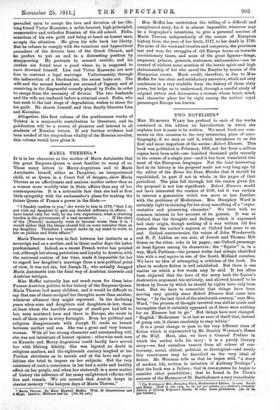MARIA THERESA.*
IT is in her character as the mother of Marie Antoinette that the great Empress-Queen is most familiar to many of us.
Those many letters to Mercy-Argenteau and to Marie Antoinette herself, either as Dauphine, an inexperienced child, or as Queen in a Court full of dangers, show Maria Theresa as an affectionate and anxious mother rather than as a woman more worldly-wise in State affairs than any of her contemporaries. It is a noticeable fact that she bad at first little sympathy with the ambassador's plans for making the future Queen of France a power in the State :—
"I frankly confess to you," she wrote to him in 1773," that I do not wish my daughter to gain any decided influence in affairs. I have learnt only too well, by my own experience, what a crushing burden is the government of a vast monarchy. . . . If the state of the [French] monarchy were to become worse than it is, I would rather that the blame should fall on some minister than on my daughter. Therefore I cannot make up my mind to write to her on politics and State affairs."
Maria Theresa was torn in fact between her instincts as a sovereign and as a mother, and in those earlier days the latter predominated. Indeed, as a recent French writer has pointed out, although her strong patriotism and loyalty to Austria, with the universal custom of her time, made it impossible for her to regard her daughter's marriage from a non-political point of view, it was not she, but Joseph II., who actually dragged Marie Antoinette into the fatal way of Austrian interests and Austrian intrigue.
Miss Moffat naturally has not much room for these later Franco-Austrian politics in her history of the Empress-Queen. Maria Theresa had many children, and it would be difficult to say that one of them occupied her thoughts more than another, whatever alliances they might represent. In her declining years when sons and daughters and daughters-in-law, those at least whom the horrible scourge of small-pox had left to her, were scattered here and there in Europe, she wrote to each of them once in every fortnight. Even her political and religious disagreements with Joseph II. made no breach between mother and son. She was a great and very human woman. With all her strong character and commanding will,
she was not intolerant of honest opinion : otherwise such men as Kaunitz and Mercy-Argenteau could hardly have served
her with lifelong fidelity. She was bigoted no doubt in .religious matters, and the eighteenth century laughed at her Puritan strictness as to morals and at the laws and regu- lations she tried to impose on her subjects. But the very -existence of such a conscience in her had a noble and healthy effect on her people, and when her statecraft is a mere matter of history the influence of her many enlightened reforms will live and remain. We are assured that Austiia keep in eternal memory "the halcyon days of Maria Theresa."
• Maria Theresa. By Mary Maxwell Moffat. With 20 Illustrations and 2 Maps, London: Methuen and Co. [lOs. ed. net.]
Miss Moffat has undertaken the telling of a difficult and complicated story, for it is almost impossible, whatever may be a biographer's intentions, to give a personal account of Maria Theresa independently of the course of European history from the year of her birth, 1717, to her death iu 1780. For none of the wars and treaties and conquests, the provinces lost and won, the struggles of old Europe borne on towards revolutionary times, and none of the great figures—kings, emperors, princes, generals, statesmen, ambassadors—can be treated of without some mention of the heroic spirit and high statesmanship of her who saved the Empire by means of the Hungarian crown. Much credit, therefore, is due to Miss Moffat for her clear and satisfactory narrative, which not only condenses in a very readable form the history of those sixty years, but helps us to understand, through a careful study of original letters and documents, a woman whose heart, mind, and character place her by right among the noblest royal personages Europe has known.


















































 Previous page
Previous page